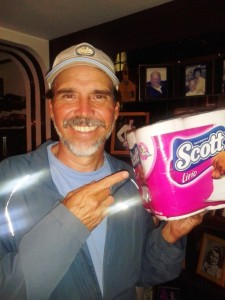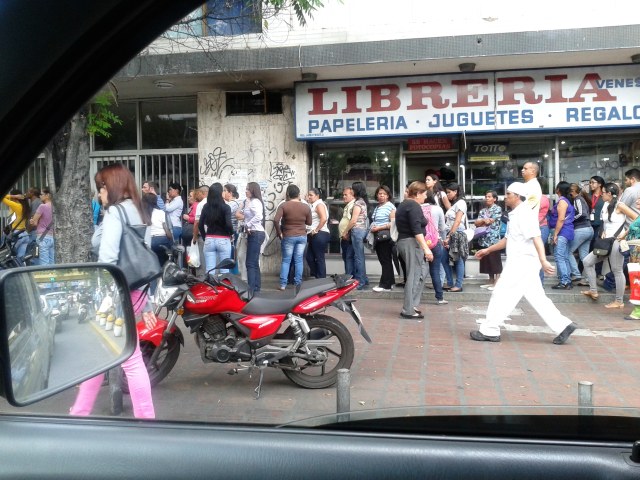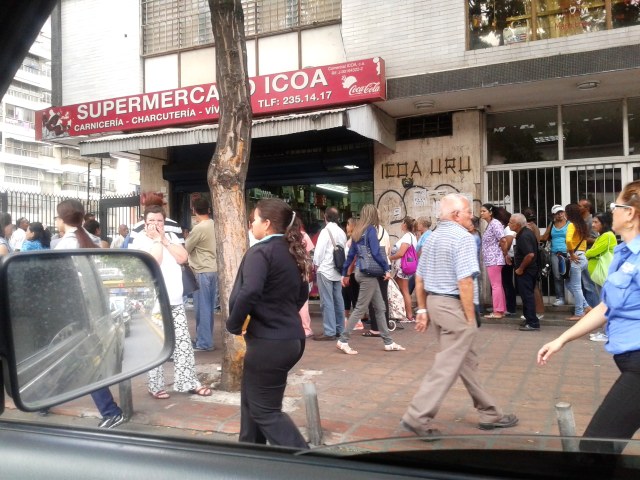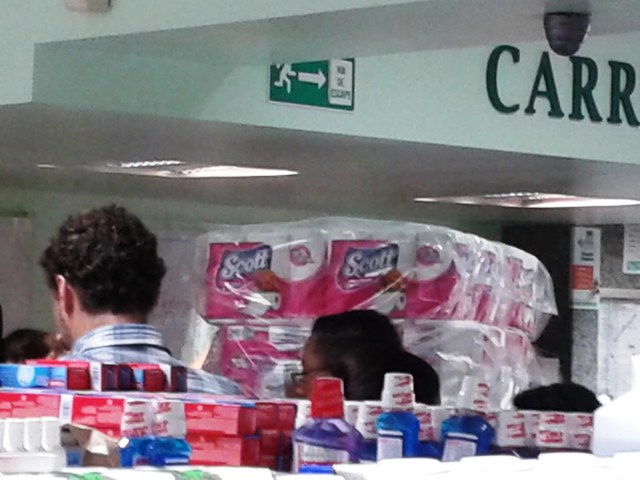
My day started yesterday with the words:
“Honey, could you buy some toilet paper today?”
Since I live with a house full of women, this is a fairly frequent request. In ordinary circumstances and in an ordinary country, this request is received and honored millions of times per day across the world. But, I do not live under ordinary circumstances or an ordinary country.
I began my quest at 10:00 AM, armed with my trusty kindle to read. On my way to the first place on my list, I was surprised, well actually maybe not so surprised, to find my path blocked because of construction to fix a huge hole in the road.
I turned around to take another route and was instantly greeted with a huge mass of cars all trying to go the same way, no doubt a result from the other street being blocked. Caracas is not a normal city where if one street is blocked, you simply take another. Depending on traffic, a wrong turn can cost you an hour in time. The city wasn’t planned for the increased amount of traffic clogging the streets.
I turned around once again, and patted myself on the back since my alternate route was clear of traffic. I arrived to my first supermarket which is a Mega Gama store in La Trinidad, fairly close t where I live. While there is a lot of talk of shortages and inability to buy certain products here in Venezuela, all true by the way, all you need to do is to walk into this store to realize, if you have money, you will never go hungry. The store is stocked with liquor and food. The problem is that the food which has regulated prices is not readily available. Instead, it comes in specific shipments, and then can only be purchased on specific days, depending on the number of your identification card.
Since there was no toilet paper for sale, I decided to see what else I could buy. I bought some canned goods, bread, vodka and mixers. Just in case the United States invades Venezuela, I need to make sure we have the essentials. Oh, yes I almost forgot, I bought ice cream as well; another essential, though very unlikely it will last until invasion.
Since I knew it might take a while for me to find the ever elusive TP (toilet paper), I decided it would be best to take the ice cream home before it melted. First things first!
Upon arriving home, I was faced with going up 12 flights of stairs to my apartment, both elevators in the building are under repair, or call for help. My SOS call met with deaf ears, since those who could rescue me, were occupied doing other things.
Fortunately, the concierge had space in her freezer, so I gave her the ice cream, hoped she wouldn’t eat it, and continued on my way.
In the meantime I had sent out a broadcast message for help finding TP on my Whatsapp group for the family. Immediately, I began receiving information:
Luvebras in La Castellana has TP, said one. Another I stopped on the street said they had some in Plan Suarez in Caurimare. Yet another said there was a TP sighting in the Mega Gama in Santa Eduvigis.
I set my sights on the Plan Suarez and was happy to see people walking around with toilet paper. Before going into the parking lot, I asked someone if there was still TP. She shook her head solemnly and said there was no more.
I thanked her and set my next destination for Gama Express in Santa Eduvigis. On the way, as I was going underneath the “elevado de Los Ruices,” I saw someone with TP and jumped for joy. “Where did you buy the TP?” I asked excitedly. My grin turned to a frown as he pointed to a long line which snaked around the building and down the other avenue.
I quickly analyzed the small size of the building and the number of people in line. I knew my university education would come in handy sometime. I surmised rapidly that by the time I parked and got in line, they would likely run out before I got to the front. So instead, I kept going.
Again, I was happy to see people walking around with toilet paper as I arrived to the Mega Gama in Santa Eduvigis. There was toilet paper everywhere! Certainly, this would be my final stop, I thought confidently to myself.
I was dazed and amazed by those toting lots of TP. My excitement was, once again, short-lived when I asked at the door where the line was to get TP.
“There is no more, just finished,” was the dreaded answer I received.
Now getting a little desperate, I walked in somehow hoping someone might have left a package of TP around. Lots of people had TP in their carts, but they guarded it closely. Trumped once again in my effort.
Back in my truck, I thought about my options, and my hunger. Luvebras in La Castellana was still a possibility, thought that tip was the first I got, and likely old information by that time, which was about 1:30pm.
Though I was frustrated at seeing so many people walking around with TP, except for me, I decided to call it a day, go home and hope someone had prepared lunch. As I meandered homeward on the Boulevard del Cafetal, I spotted more people with TP!
I looked quickly across the street and saw even more people with TP coming out of the Plaza’s in Santa Ana. This could be it, I thought to myself. I went around Plaza las Americas, headed back to the supermarket and confirmed my perception with someone outside regarding the availability of my precious prey. She confirmed:
“Oh yeah, they have TP, and a lot of it!”
The adrenaline of achieving my objective superseded my hunger, so I downed the last few “tostones” (banana chips) I had bought on my first stop, and rolled into a parking place which mercifully became available on my first go around.
I walked into the supermarket and there was mayhem. People everywhere, going this way and that, but the best part is, they all had TP! Well, I say all, that isn’t really true. ALL those whose ID number finalizes in 3 or 4 had TP, the rest had none. More on this interesting fact later as well.
I was directed to the other end of the store to the end of a line which coursed from one side of the supermarket to the other. After confirming I was in the right line, I began the wait, hoping and praying they would not run out before I got to the front of the line. As I stood in line, I saw carts of toilet paper, corn flour, sugar and feminine products (other items which are scarce) being wheeled by me. My belief I was close to my objective became even stronger. Finally, when I was close to having a household of happy campers, I took this picture:
One hour after entering this last store, a woman checked my identification, confirming the last number ended in three or four, and directed me into an area where I was given four kilos of sugar, four kilos of corn flour, four cans of tuna, some feminine product with “wings” (I think wings are good, but can’t be sure) and…
T O I L E T P A P E R
I had only one last battle to fight, which was to pay for what they had just given me. Mercifully, the express line was open and had only two people in it. I had already scoped out the other lines which had a lot more people and lot more items to pay for. I hoped the cashier wouldn’t count all my articles, since I was over the 10 item limit for the express line.
When they gave me the other, after presenting my identification, they had asked me whether or not I wanted chicken. I have learned to just say yes, and buy everything they have available at the time, so I said yes.
Now I had the dilemma of trying to drag all the items I already had with me back to the meat counter to get my chicken and get into another line, or bag the chicken, so to speak, for another day. I noticed the woman who was behind me in the original line, got behind me in the express line. I saw my chance to get my chicken!
I asked her if she could watch my things for me, briefly considered grabbing the TP, just in case. When she agreed, I figured I was just being paranoid, left my TP, along with the other regulated products I had received, and took off toward the meat counter. As I made my way through the throng of people, it suddenly occurred to me there may be another line at the meat counter, or worse yet, someone might grab my TP!
Fortunately, getting the chicken involved only presenting a card I had been given at the other counter. I was given a frozen chicken, and was happy to see no one had walked off with my TP when I got back into line.
I paid for my purchase, got back in my truck, drove back to my apartment, packed my first purchases into a backpack, got the ice cream from the concierge (fortunately it was intact), and walked up the 12 flights of stairs to my apartment, exhausted but content I had completed my mission at 3 PM, FIVE HOURS LATER.
My family greatly appreciates my effort and has reimbursed me with hugs and kisses. In short, we have happy hindquarters.
Despite the happy ending, all is not well just this side of paradise…
If you care to know about happening in Venezuela from my point of view, read on. If not, so long for now…
…
Many years ago, I was coming back from one of the many trips taking me to and from Maiquetía, where the international and domestic airports are located. Driving up the hill and through the tunnels which take you from sea level, at the airport, to about 3,000 feet, where Caracas is situated, the song “Welcome to the Jungle” by Guns N’ Roses came up on my playlist.
https://www.youtube.com/watch?v=o1tj2zJ2Wvg
Listening to the lyrics, I realize I live in a sort of “jungle,” so to speak. Since 1992, when I first moved here, I had not really quite put my finger on life in Caracas. The song struck a chord connecting me with what life is like in Caracas. Since that day, “Welcome to the Jungle” has been my battle cry as I arrive to this city, which despite all its problems, I have come to love, and where I call home.
As I write these lines, I read for the first time the lyrics to the song, “Welcome to the Jungle.” I must confess much of what I understand from the lyrics really has no connection with the feeling I have when I hear the song, though these particular words do seem apropos.
Welcome to the jungle
It gets worse here everyday
Ya learn ta live like an animal
In the jungle where we play
If you got a hunger for what you see
You’ll take it eventually
You can have anything you want
But you better not take it from me
These words will actually make a very good opener to an idea for a book I have called:
LA LEY DEL VIVO
Loosing translated, it means:
THE LAW OF THE FITTEST
If you don’t watch out in the jungle, the jungle will take you down, as they say in the song. Caracas is one of the cities with the highest crime and homicide rates in the world. If you don’t watch your backside, someone will take it!
So why do I live in this crazy city, which I call “The Jungle”?
The fact is that despite the social and economic problems, which are very serious, I love the spirit of the Venezuelan people, I love the Avila, and I love the climate.
People in Venezuela have a natural vibrancy to them I have seen in few other places. The Brazilians have a similar sort of “vibe.” It is hard to explain, but easy to feel. For those who have met and come to know Venezuelan people throughout the world, you will probably know what I am talking about. Venezuelan’s have a certain “chispa” or energy which lets you know you are truly alive when they are there. This is perhaps part of the enchantment I have found in Venezuela.
The Avila, which separates Caracas from the Caribbean, rises an additional 3,000 feet before dropping 6,000 feet the other side to the ocean. While there are many places where you can excursion into the mountain, my favorite entry point is at the “Guardaparque de Pajarito.” It is actually an entrance for a fire station serving the area, and leads to “Quebrada Pajarito,” and “Quebrada Sebucán,” to a place I call “Heaven.”
And finally, the climate, which is ideal, makes me love Caracas. Year round it rarely gets below 60 degrees or above 90 degrees Fahrenheit. In my apartment, which is open to the elements where I now sit, we need no air conditioner, or heater. Virtually 365 days a year, I can sit up here “on top of the world” looking down and rarely ever even need a sweater.
Why am I telling you this, and why should you care?
Caracas and Venezuela, both have a bad rap. While deservedly so, for a variety of reasons, it is the place I call home for these and many other reasons.
Now, here comes the bad part. Bad, because I truly believe the problems Caracas has specifically, and Venezuela has in general, are simply the result of human idiocy.
Mind you, this is not a diatribe against the current regime nor is it politically biased. I do not ultimately believe the problem is political, rather social.
I do not believe Chávez, or Maduro, or any of their cohorts are fully responsible for the problems we now have though I do believe they have exacerbated the problem, making it worse with silly decisions based on a political rather than a social agenda.
Here is a little history of my time in Venezuela and how it relates to current social and economic crisis, as I see it.
I moved to Venezuela in August, 1992, right between the first and second coup d’états of Hugo Chavez. At that time, the exchange rate of the Venezuelan bolivar to the US dollar was about Bs. 70 to US$1. There was a free exchange rate making it possible to walk into the bank and change local currency into dollars with no problem whatsoever. There was a price to buy, and a price to sell. The difference being the banks profit, as is the case with most currencies in the world.
In 1993 and 1994, local interest rates began rising dramatically. Some local banks were paying annualized rates of 70 to 80% for deposits, while charging 10 to 15% more for credit. As is usually the case, higher interest rates generally mean increased risk. This was no exception. A major bank by the name of Banco Latino, along with several others, went bankrupt and many lost thousands, and in some cases millions of dollars, since the offshore dollar accounts were affected as well as local deposits.
Since that time, years before Chávez and the current regime began messing things up, Venezuela has been under a state of various currency controls. Each new change tends to come up with new initials reflecting the new government organization in charge of regulating currency.
While to people in the United States of America, and many other parts of the world, it is hard to fathom what this means, I will describe how the current system works the best I can.
An exchange control gives a preferential rate of exchange for the local currency into some foreign currency. It could be dollars, euro’s, yen or any other currency.
Sometimes there are several bands. Each is used for a specific sector. For example, basic necessities like medicine and food have one rate, while all other imports have another. The important part is that it is the government organization which authorizes and distributes the currency based on their guidelines.
The purported benefit to society is for basic necessities to be available at much more affordable prices. In theory, these practices seem to make sense, in practice, they fall down like a house of cards, and this is what we are experiencing now in Venezuela.
My five hour journey yesterday netted me 4 kilos of sugar, 4 kilos of corn flour, 4 cans of tuna, some feminine product with “wings” and a big bag with 12 rolls of toilet paper. The total price in dollar terms for what I bought was a whopping US$3. Three dollars, can you see why people are willing to wait in line to buy these basic necessities?
The problem is that the government must finance the differential in the exchange rate. While I have lost track of which exchange rates are currently in vogue, and at what rates, the fact of the matter is that dollars are not being issued in the quantities necessary to meet demand, thus the shortages we now have.
No supply with normal demand leads to shortages, compulsive buying and subsequent hoarding. This, of course, simply worsens the problem.
The basic fault with all of the exchange rate controls I have been witness to in Venezuela, and also for three years in Argentina, is that it opens the door to corruption.
Certain individuals are granted the authority to give others the right to buy dollars at a huge discount to the current rate on the street, commonly called the black market rate.
For example, right now one dollar on the street costs over 300 bolivares, while the government has bands ranging from 6.30 to the dollar up to about 180 to the dollar. It doesn’t take a brain surgeon to figure out you can buy money at a lower rate and sell it at a higher rate all day long to make a literal money machine.
The corruption begins to be an inherent part of the system. Meanwhile, the government makes it almost obligatory to break the law by buying foreign currency on the black market, because access to foreign currency through the legal mechanism is not only complicated by an interminable amount of red tape, but also completely blocked randomly by the government, which is reeling from the cost of subsidizing the controls.
Since I believe in solutions, what is my solution?
My solution is a difficult one, but one which should work. Phase out all the exchange controls over a short period of time. The shock on the economy would be difficult to assimilate, but within a short-time market forces would take over, prices would stabilize at the rate determined by the market, and people can get on with their lives.
Until access to foreign reserves is made more liberal and accessible, the country will continue to experience shortages and economic difficulty.
In closing what originally was going to simply be a humorous antidote but instead turned into a bit more, I believe the real problem is not the government, rather a system which encourages corruption and rewards those who are able to be “más vivos” (more aware) than others.
Any society is a reflection of its people and its values. Unfortunately, Venezuela is now seeing its own reflection in the mirror. While the situation is likely to get worse before it gets better, if the government starts to seek economic advice from people who know what they are talking about, rather than politicians with an agenda, there is a way to get out of the current mess.
I sure hope it happens soon. I’m not sure how long 12 rolls of TP will last in my household. If past experience is any indicator of future behavior, it won’t be long before once again I am asked:
“Honey, can you buy some toilet paper today?”
∞ Rob McBride ∞
2015 05 20




